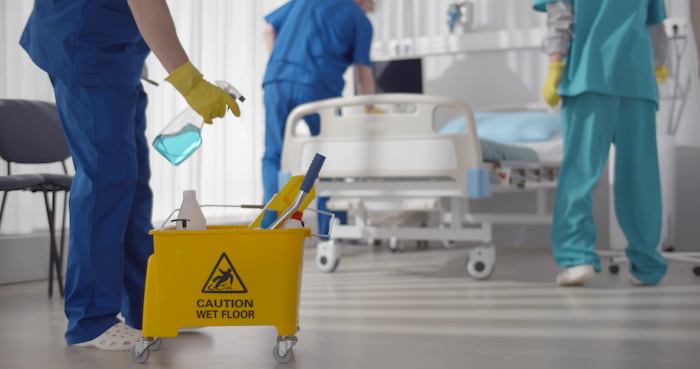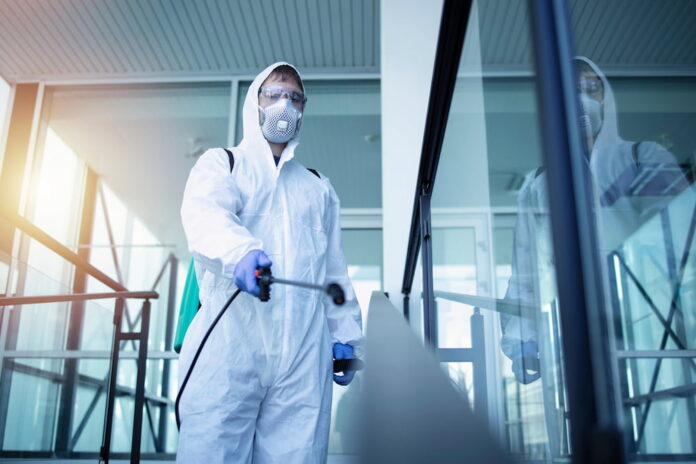Germs from one person can easily be transferred to another, even without direct contact. These can be transmitted by touching an object or surface that isn’t thoroughly cleaned and sanitized. It’s vital in hospitals and other healthcare settings to properly clean and disinfect to avoid spreading germs, bacteria, and viruses, preventing people from getting sick.
Here are the reasons why it’s essential to disinfect in the healthcare industry:
1. To Prevent The Spread Of Unwanted Bacteria
According to Hygieia-San, one of the most significant factors people look for in a hospital, clinic, or laboratory is its cleanliness, hygiene, and sanitation. A clean and sanitized hospital lobby, clinic reception area, and shared bathroom give an excellent impression to patients—and they’ll feel more comfortable using those areas.
It also makes them feel less anxious about getting infected due to airborne diseases and bacteria from surfaces that may compromise their health. It also follows that if the common area is clean and well-maintained, the rooms and the medical services are excellent too. Hospitals and clinics are businesses. It’s essential to give the patients and customers a superb perception so they’d return if needed.
2. To Keep Surfaces Clean For Other Patients And Health Workers
High-touch surfaces are often touched by people that may be easily contaminated and picked up by others using their hands. These include the light switch, door knob, bed rail, bed frame, tray table, IV pole, and other shared equipment.
These are also surfaces in the bathroom like the faucet, toilet, flush handle, bathroom tissue rolls and dispenser, hand dryer, and sink.
Your hands touch many things throughout the day and risk carrying microorganisms that may enter your body like eating without washing your hands.
That’s why cleaning and disinfecting these high-touch surfaces is essential to prevent these microorganisms from spreading, especially after a patient is discharged and another occupies the same room. It’s not only for the patient’s safety but also for the medical practitioners and other workers.
3. To Avoid Transmission Of Infectious Diseases
After every use, medical supplies such as face masks, oxygen masks, syringes, gloves, and bandages must be disposed of. These must be appropriately segregated to avoid contamination and the spread of diseases.
Medical equipment and supplies like stethoscopes, digital thermometers, blood pressure monitors, patient monitors, EKG/ECG machines, defibrillators, X-ray machines, and the like should be cleaned, sanitized, and disinfected after each patient’s use to avoid transfer of germs from one person to another.
Proper cleaning and disinfection also ensure the safety of doctors, nurses, and other medical workers. They’d be able to work without worrying too much about their health.
4. To Ensure That Common Areas, Rooms, Equipment, And Supplies Are Bacteria-Free

Cleaning removes dust, dirt, or other impurities from an object, surface, or environment. Usually, you can already tell if a thing or surface is already clean just by looking at it. But you’re still unsure if it’s free of germs because those microorganisms are too tiny for the naked eye to see.
Remember, bacteria can stay up to five months on a dry surface. That’s why it’s essential to disinfect after cleaning and follow the instructions of the disinfecting products to ensure that germs, bacteria, and viruses will be killed.
Also, be mindful of how long the product or chemical should sit on the object, equipment, or surface to kill the bacteria. Doing a deep cleaning and sanitation is better than risking being sick.
5. Important For The Immune System
When people are healthy, they’re less likely to get sick. Their bodies have ways to fight against infection. However, most patients are ill in hospitals and clinics, and their immune system is weak. They’re more vulnerable to bacteria.
It poses a higher chance for them to acquire more diseases and might bring their health at risk.
That’s why it’s vital to keep the hospitals and clinics clean and disinfected to eliminate or at least lessen the chance of getting an unwanted disease. It’ll only not benefit the patients but the people in the workforce as well.
Final Thoughts
People go to hospitals or clinics to seek medical attention and treatment to feel better and healthier. On the contrary, there’s a risk of going to the hospital as you might have exposure to harmful bacteria and diseases.
But you don’t need to worry since this will be prevented if proper cleaning, sanitation, and disinfection are implemented in clinics and hospitals.
You must always be diligent in selecting the healthcare provider you entrust your health to. Consider the ideas mentioned here as you plan and prepare.
Read Also
- Transforming Patient Care with Professional Healthcare Transcription ServicesIn today’s fast-paced healthcare environment, the need for precise and timely documentation cannot be overstated. Accurate documentation is not merely an ancillary task; it is a core element of delivering high-quality patient care. The ability to maintain compliance with regulations, enhance operational efficiency, and ensure the integrity of patient records has never been more critical.… Read more: Transforming Patient Care with Professional Healthcare Transcription Services
- Essential Steps to Launch Your Own Optometry PracticeLaunching your own optometry practice can be a thrilling and fulfilling journey. However, it requires careful planning, dedication, and an understanding of what it takes to succeed. With the growth in demand for eye care, more and more individuals are seeking to start their own practices. But how do you get there? This guide walks… Read more: Essential Steps to Launch Your Own Optometry Practice
- Compounding Pharmacy: Personalized Medication SolutionsA compounding pharmacy plays a vital role in modern healthcare by providing customized medications tailored to the specific needs of individual patients. Unlike mass-produced drugs manufactured by pharmaceutical companies, compounded medications are prepared by licensed pharmacists who carefully combine, adjust, or modify ingredients to create a formulation that best suits a patient’s unique medical requirements.… Read more: Compounding Pharmacy: Personalized Medication Solutions
- The Best Business Decision a Surgeon Ever Made: Ordering a Medical Equipment AppraisalMost surgeons don’t go into medicine because they love spreadsheets, valuations, or negotiating buy-ins. They go into medicine because they want to operate, treat patients, and build something meaningful over time. For one surgeon, that mindset worked perfectly, until the day another surgeon decided to buy into his practice. That moment exposed a problem he… Read more: The Best Business Decision a Surgeon Ever Made: Ordering a Medical Equipment Appraisal
- Creative Approaches to Alleviating Healthcare Staff ShortagesHospitals and clinics are facing staff shortages, which makes it harder to take care of patients well. Finding simple and useful solutions is very important. Easy changes like flexible work hours, good training, and chances to grow can help staff stay happy. Technology, like online doctor visits and helpful tools, can make work easier. Smart… Read more: Creative Approaches to Alleviating Healthcare Staff Shortages






